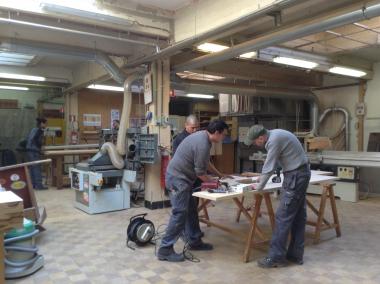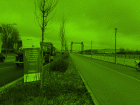
With support from the European Regional Development Fund (ERDF), the employment services centre brings together in one location all the services that job-seekers need.
***
2014-03-21 – On the boundary between two different neighbourhoods – one more working-class and the other more middle-class in nature – we find ourselves in a pleasant little street. We are a stone’s throw from the Neptunium swimming pool in Schaerbeek, between Josaphat Park and the Town Hall. Various signs advertise the many businesses here that generate employment. A playground stands cheek-by-jowl with the garages and planters of the horticultural service. In the background, the aroma of rough timber drifts out of a workshop. We are at Schaerbeek employment services centre – what used to be known as the ‘Mission locale’ but is now officially called the ‘Pôle emploi’.
‘We’re not particularly keen on the term,’ says Marc Rents, the director. ‘It sounds too much like the employment offices in France, where a different approach is used. Here, we focus on welcoming job-seekers, coaching, training and links with the world of work and business.’ All the tools in this more holistic approach to work are assembled here in Rue de Jérusalem, in what we will therefore call the local employment mission.
Successive investments
The space is extensive. It bears the traces of successive rounds of funding, which paid for the renovation of first one wing of the building and then the other. On the first floor, the local employment mission’s premises are modern and bright, with plenty of windows. The offices and training rooms are here. This part is financed by the European Regional Development Fund (ERDF). Marc Rents briefly explains how the various services came together here.
‘Initially, the idea was that “Maisons de l’emploi” (employment centres) were supposed to be set up in each municipality of the agglomeration of Brussels. Here at Schaerbeek, we anticipated this trend by launching our activities sooner. In the town there were two organisations working in this field, on Rue Gallait and here. In one building there were the active job search workshops and the local premises of Actiris (the Brussels Employment Office), the local business service centre and even Atrium, the regional commercial development agency. The other building housed the old municipal services for the control of the unemployed.’
Everything has now been brought together into one space. There is also the Maxinet service voucher organisation, a computer space, Werkwinkel, JST (on-the-job training for young people)… and in fact, any service a job-seeker may require.
‘Specifically,’ explains Marc Rents, ‘the coaching takes two forms. There is job coaching (working on creating a CV, understanding the skills you have to offer, and making optimal use of your CV), and if necessary there is also individual coaching. We also help people with choosing a career and offer professional training. For example, four career guidance sessions are organised per year. In terms of training, we currently train assistants for the medical professions, pharmacy and dentistry. We also recently completed a training course in creating green roofs.’
The local employment mission is always looking for innovative solutions in terms of both the substance of its activities and its approach. The ultimate goal is to forge links between people’s skills and aspirations and what businesses are looking and asking for. Every year, some 2,200 people receive coaching, while 120 attend training.
A fine carpentry workshop
The buildings extend over 2,250 m². On the first floor are the well-lit offices and meeting rooms of the local employment mission. There is even a small terrace, which is very pleasant when the weather is fine. Thanks to the Jérusalem district contract (the regional urban renovation scheme), it has been possible to run workshops for on-the-job training. The Schaerbeek office of Actiris occupies the ground floor. In the long run, Actiris will also occupy an additional 200 m² in the most remote part of the building. The ground floor also has the premises of Werkwinkel, the local Dutch-speaking employment mission.
As a result, there are plenty of people about the place – in fact, around a hundred people between the different projects.
The tour continues into the bowels of an older building. A room full of computers and their users forms the public computer space, to which there is free access. The non-profit association Promotion vzw also has a room here. Right at the back of the building, where you come to social housing run by Le Foyer Schaerbeekois, are the premises of Maxinet and the local employment agency. This means lots of activity. ‘Bringing all of these organisations together like this creates a real opportunity to exchange information and makes things easier for job-seekers,’ Marc Rents points out. ‘Around a quarter of the people who come here are between 18 and 25 years, half between 25 and 44 years and a quarter over 45 years.’
With spring upon us, the municipal horticulture team has lots of troughs and planters outside. Training for work in this sector takes place in the municipal parks. The doors of a huge shed are opened to reveal a beautiful carpentry workshop. All the relevant machinery and associated safety equipment is kept there. The aroma of rough timber is inviting – someone needs to go and make something with it. And ultimately, the young carpenter that does so will find work.
Jean-Pierre Borloo



















